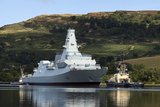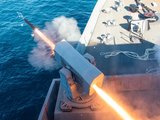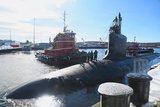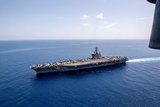German Navy frigate begins in-port trials
The German Navy’s third F125 class frigate, the Sachsen-Anhalt, has sailed for the first time from the shipyard in Hamburg, Thyssenkrupp announced on 22 February.
The ship will undergo in-port trials, which will see its technical systems and equipment, including propulsion system, manoeuvring behaviour and technical operations, tested over a period of around two weeks.
For the trials, the ship will sail from Hamburg via the river Elbe to the North Sea before returning to Hamburg. Onboard is the technical team from the German defence procurement agency, the testing team from the ARGE F125 consortium and members of the future crew.
The Sachsen-Anhalt is the third of the F125 class frigates to take to the open seas after the Baden-Württemberg and the Nordrhein-Westfalen.
The F125 class ships have been designed with a high degree of automation. The vessels are capable of conducting sea operations for up to two years with a smaller crew and a multiple-crew strategy enables the entire crew to be changed during deployment.
The ARGE F125 consortium, which was awarded the contract for the German Navy’s F125 programme in 2007, comprises Thyssenkrupp Marine Systems as the lead company and Lürssen Werft. Blohm+Voss Shipyards is manufacturing stern sections, joining the two sections and carrying out further fitting out.
More from Naval Warfare
-
![US Navy to develop an undersea networking capability to support UUV operations]()
US Navy to develop an undersea networking capability to support UUV operations
The NEREUS project aims to enhance and expand the US Navy’s existing communications systems, enabling crewed/uncrewed seabed and subsurface missions.
-
![How the Hedge Strategy will impact the US Navy’s future capabilities]()
How the Hedge Strategy will impact the US Navy’s future capabilities
The US Navy Hedge Strategy is intended to provide a lethal, modular and cost-effective fleet while accepting Washington’s fiscal and industrial constraints.
-
![US Navy and Raytheon explore additional applications for Mk 58 CRAW torpedo]()
US Navy and Raytheon explore additional applications for Mk 58 CRAW torpedo
Designed as an anti-torpedo and anti-submarine capability, the USN and RTX foresee the Compact Rapid Attack Weapon’s potential for deployment from surface ships and aerial and uncrewed platforms.
-
![European navies line up $105.8 billion in unawarded contracts for 2026]()
European navies line up $105.8 billion in unawarded contracts for 2026
France, Germany and Italy lead the way on unawarded naval defence opportunities that could be awarded this year, but across Europe countries are ramping up their spending efforts to face geopolitical challenges.






















